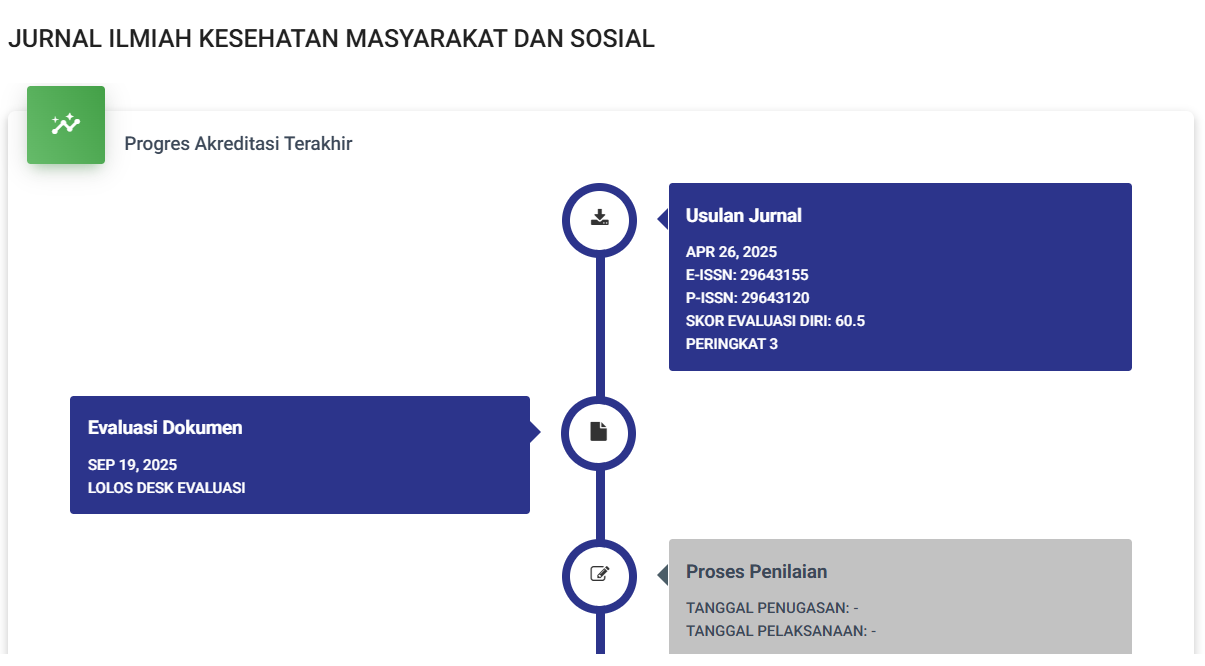HUBUNGAN PENGETAHUAN DAN PENDAPATAN KELUARGA DENGAN KEJADIAN STUNTING PADA BALITA DI WILAYAH KERJA PUSKESMAS IDI RAYEUK KABUPATEN ACEH TIMUR TAHUN 2023
DOI:
https://doi.org/10.59024/jikas.v2i1.735Keywords:
stunting, toddlers, knowledge, incomeAbstract
Stunting is a national and global nutritional problem that requires attention from various sectors. Each individual's nutrition can be considered as an indicator to determine a person's health status, including the toddler group. Nutrition also has an impact on the level of harmony between a person's physical condition and mental condition. Insufficient knowledge and low family income are thought to be important factors in increasing the risk of stunting. The aim of this research is to determine the relationship between knowledge and family income and the incidence of stunting among toddlers in the work area of the Idi Rayeuk Community Health Center, East Aceh Regency in 2023. This type of research is analytical observational with Cross-Sectional. The population in this study is the population in this study is all toddlers or all toddlers in the Idi Rayeuk Community Health Center Working Area, East Aceh Regency in 2023, a total of 61 people. The sample was taken as a total sampling, namely 61 people. Data analysis was carried out using statistical tests using chi-square, to see the relationship between the independent variable and the dependent variable. The results of the research show that there is a relationship between knowledge and family income (p<0.005) with the incidence of stunting among toddlers in the Idi Rayeuk Community Health Center Working Area, East Aceh Regency in 2023. It is recommended that the Community Health Center provide education to parents so that they have good knowledge of skills in the pattern of take care of toddlers so that the risk of stunting can be reduced.
References
Achadi, L.A., 2017. Seribu Hari Pertama Kehidupan Anak. Disampaikan pada Seminar Sehari dalam Rangka Hari Gizi Nasional ke 60. FKM UI, Maret 2021 Depok.
Adriani, M., Wirjatmadi, B., 2018 Gizi dan Kesehatan Balita. Jakarta: Kencana
Brinkman, H.J, de Pee, S., Sanogo, I.. 2018. High Food Prices and The Global Financial Crisis Have Reduced Access to Nutritious Food and Worsened Nutritional Status and Health. J. Nut, 140, 153S—161S.
Chertoff,. 2015. Protein Malnutrition and Brain Develovment. Brain Disorders & Theraphy. 4:3. Diunduh dari http://dx.doi.org/10.4172/2168-975X.1000171 Diunduh tanggal 03 Maret 2022.
Dewey, K.G., and Begum, K. 2019. Long Term Consequences of Stunting in Early Life. Maternal and Child Nutrition.7: p.5-18
FAO, 2017. The State of Food Insecurity in the World. Strengthening Enabling the Envirovement to Improve Food Security and Nutrition.Rome : FAO
Hanum, F., Khomsan, A., Yayat Heriyatno, Y., 2017. Hubungan Asupan Gizi dan Tinggi Badan Ibu dengan Status Gizi Anak Balita. ISSN 1978 – 1059.Jurnal Gizi dan Pangan, Maret 2014, 9(1): p.1—6
Kadir S., Houser, R.F., Must, A., de Fulladolsa, P.P, Bermudez, O.I., 2017. Disentangling Nutritional Factors and Household Characteristics Related to Child Stunting and Maternal Overweight in Guatemala. Economics and Human Biology, 8(2), 188—196.
Kemenkes. 2018. SK Menkes tentang Standar Antropometri Penilaian Status Gizi Anak. Direktorat Jenderal Bina Gizi dan Kesehatan Ibu dan Anak. Direktorat Bina Gizi.
Kusharisupeni & Nuryanto. 2017. Faktor Risiko Kejadian Stunting pada Anak Usia 2-3 Tahun (studi di Kecamatan Semarang Timur). Journal of Nutrition College, 2(4), p. 523—530
Kurniasih, L., 2017. Sehat dan bugar berkat giziseimbang. Jakarta: Gramedia
Laus, M.F., Vales, L.D., Costa, T.M., Almeida, S.S., 2018. Early Postnatal Proteincalorie Malnutrition and Cognition: a Review of Human and Animal Studies. Int J Environ Res Public Health 8: 590-612
Lestari, L., Wanda, Margawati, A., Rahfiludin, Z., 2019. Faktor Resiko Stunting pada Anak Umur 6-24 Bulan di Kecamatan Pananggalan Kota Subulussalam Provinsi Aceh. Jurnal Gizi Indonesia 3.1;37-45
MCA-Indonesia, 2018. Proyek Kesehatan dan Gizi berbasis Masyarakat Untuk Mengurangi Stunting. In: Corporation MC, editor. Jakarta
Putri, D.S.C., Utami, N.H., 2015.Nilai Batas Berat Lahir sebagai Prediktor Kejadian Stunting pada Anak Umur 6-23 bulan di Indonesia. Pusat Teknologi Intervensi Kesehatan Masyarakat Badan Litbang Kesehatan, Jl Percetakan Negara 29 Jakarta, Indonesia
Rahayu, A., Khairiyati, L., 2018. Resiko Pendidikan Ibu Terhadap Kejadian Stunting pada Anak 6-23 Bulan. Penelitian Gizi Makan, Drsember 2014 Vol. 37 (2): p.129-136
Siswanto, A., 2018. Epidemiologi Gizi. Erlangga Medical Series (EMS)
Soekirman. 2019. Pencegahan Stunting. Seminar Gizi November 2013. Diunduh 03 Maret 2021
Supriasa, I.D.N, Bakri, B., Fajar, I., 2016. Penentuan Status Gizi. Edisi 2. Jakarta: EGC. Penerbit Buku Kedokteran.
Uauy, R., Desjeux, J.F., Ahmed, T., Hossain, M., Brewster D., et al. (2017) Global Efforts to Address Severe Acute Malnutrition. J Pediatr Gastroenterol Nutr 55:p.476-481
UNICEF. 2019. World Health Statistic 2019. United Nations Children’s Fund
USAID. 2018. Save the children-state of the world’s mothers. Nutrition in the First 1,000 Days. Johnson & Johnson, Mattel, Inc and Brookstone.
Welassih. B.D, Wirjatmadi R.B.,.2016. Beberapa Faktor yang Berhubungan dengan Status Gizi Balita Stunting. The Indonesian Journal of Public Health, Vol. 8, No. 3 Maret 2021: p. 99–104
WHO. 2019. Global Nutrition Targets 2025: Stunting Policy Brief. Geneva World Health Organization. ([Internet]; 2019. Available from: http://www.who.int/nutrition/topics/globaltargets_stunting_policybrief. pdf.
Downloads
Published
Issue
Section
License
Copyright (c) 2024 JURNAL ILMIAH KESEHATAN MASYARAKAT DAN SOSIAL

This work is licensed under a Creative Commons Attribution-ShareAlike 4.0 International License.










